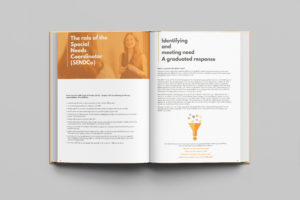The SEND Group is all about empowering your achievements, delivering resources through webinars, training and other services. To support those working within the field of special education needs and disabilities.
We know this is a bit of a minefield and we’ve been working closely with Beccie Hawes, Head of Services at Cadmus Inclusive, to create this Mini SEND Guide to support those working within this field.
The Mini Guide is aimed to provide you with lots of useful nuggets of information to save you and your colleagues time in your day-to-day work. Empower everyone as everyone is a teacher of SEND.
SEND: The Things and The Stuff A ‘go to’ mini guide has got plenty of useful bits of information. From looking at legislation, to supporting students with different difficulties, looking at provision mapping, Preparing for Ofsted, the Equality Act and many other additional details.

This is now available as a digital download and pre order for a hard copy.
Check out our resources page, where you can download a number of resources from the guide for Free.

